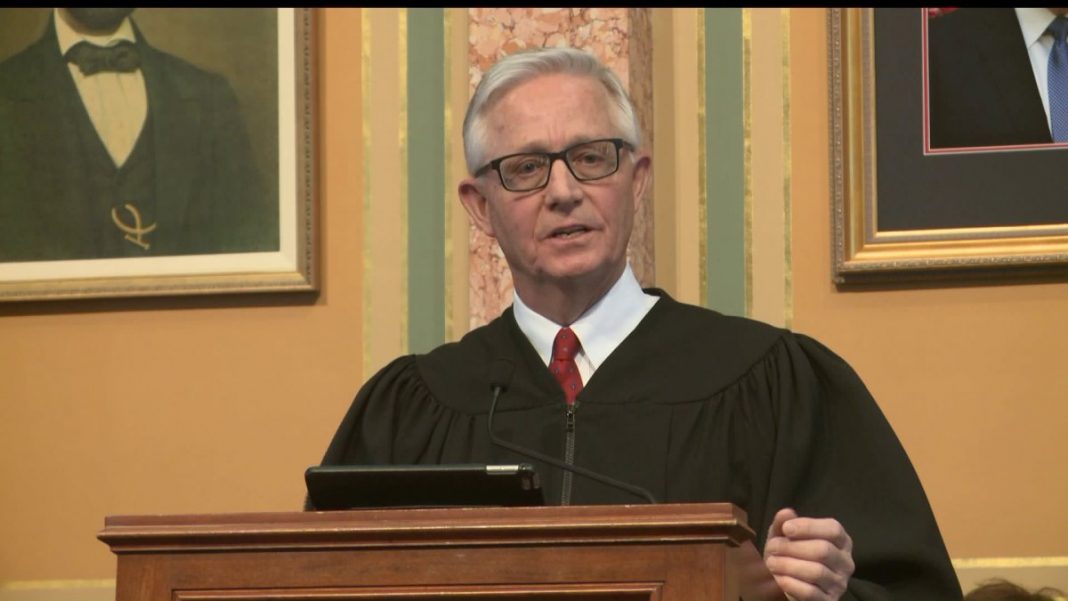The Iowa Standard is a free online news source so we can reach as many people as possible. But we need to raise money! We are asking our readers to help support us as a news alternative entering 2020. If you could, please consider showing a sign of support to The Iowa Standard by making a contribution here. Or, you can use Venmo and make a contribution to @Iowa-Standard-2018.
You could also send a check to:
PO Box 112
Sioux Center, IA 51250
Judicial nominating was a top priority for Iowa Republicans in 2019.
The Iowa Judicial Branch took a neutral position on the bills publicly, but worked behind the scenes — and without public knowledge — to campaign against the bill. That’s according to public records between Chief Justice Mark Cady and his staff, who coordinated a campaign against changes to the process.
The Iowa Standard is awaiting more documents. We did receive an initial batch, however, state court administrator Todd Nuccio cited “attorney client privilege, attorney work product doctrine and deliberative process privilege” to withhold an unknown number of communications.
According to Randy Evans, executive director of the Freedom of Information Council, Iowa does not have a deliberative process privilege. The open records law does allow for a privilege for draft documents, but that privilege does not apply when the documents are in the hands of the decision makers.
So it is difficult to understand how Cady and his staff could rely on the deliberative process privilege. It seems they are expanding that law for themselves.
What is clear, though, is that Cady had specific concerns about the proposal that altered the term of the chief justice from eight years to two.
On Feb. 5, one day after a bill was introduced to change the judicial nominating process, Cady wrote to David Brown, a Des Moines attorney.
“I will be speaking at the ABA conference in Austin next year as the chief of the chiefs,” he wrote. “That chief title, however, could be short-lived. I don’t know if you noticed, but the merit selection bill introduced yesterday also reduces my 8 year term as chief justice to 2 years and requires the court to have a new vote every two years thereafter. Not quite sure what to make of all of it, other than either a response to the way I am handling my job or my majority opinion in the Planned Parenthood case last year.”
Cady called the change, which gives the justices more power to decide their chief, “an affront to judicial independence.”
Despite Cady’s strong opinion, the Judicial Branch’s three registered lobbyists — Caitlin Jarzen, Molly Kottmeyer, and Todd Nuccio — registered undecided on the bill rather than opposed. Kottmeyer is the counsel to the chief justice.
Their actions over the next few months, though, reveal anything but an “undecided” position. Those same lobbyists and Cady worked directly with the Iowa State Bar Association and lobbyists with the Iowa Association for Justice to support a grassroots effort against the bill.
Jim Carney, Bar Association lobbyist, sent an email to Cady on Feb. 22 attaching a letter from Principal CEO Dan Houston. Houston had sent the letter to Gov. Kim Reynolds. Carney and Cady discussed the letter the night before. Carney assured Cady “we are going to continue all of our efforts.”
Those efforts did indeed continue. At times it seems the Judicial Branch lobbyists were spearheading them.
On April 5, Kottmeyer sent the Bar Association lobbyists (Dorman, Struyk and Carney) a newsletter from Rep. Gary Worthan (R-Storm Lake). Kottmeyer highlighted part of the article where Worthan, after discussing the judicial selection bill, said that he had “not heard from many constituents on the issue and would be interested in their opinions.”
Carney sprung into action. He drafted a communication to attorneys in Buena Vista County asking that they contact Worthan. He copied Kottmeyer on the internal Bar emails regarding the plan “so she knows what we’re doing.” He thanked Kottmeyer for bringing the newsletter to his attention.
“We need your help,” Carney’s draft letter to Buena Vista County attorneys read. “Please take a moment and immediately contact Representative Gary Worthan and urge him to oppose this legislation. Have any business clients that you can talk to communicate with Gary about opposing this legislation.”
Carney included Worthan’s email address as well as his home phone number. He requested any emails sent to Worthan also be copied to Iowa State Bar Association President Tom Levis and Jim Carney.
Carney emailed Kottmeyer an editorial saying “we can talk more about this.” He also sent an email from Rep. Jeff Shipley (R-Fairfield), who addressed the partisanship of the nominating commission and of Justice David Wiggins specifically.
Carney asked Kottmeyer to call him about Shipley’s comments.
Kottmeyer also sent a newsletter from Rep. Sandy Salmon (R-Janesville) that explained why the bill on judicial selection reform was necessary. Kottmeyer sent that information to Carney, Struyk, Dorman, Jarzen, Paschke and Lisa Davis-Cook.
Kottmeyer sent a PDF of an article from a forum hosted by Rep. Tedd Gassman (R-Scarville) to Carney, Struyk and Dorman. Carney sent an email to Kottmeyer, Struyk, Dwight Dinkla and Dorman urging them to check out Sen. Jake Chapman’s (R-Adel) judicial activism button.
On March 11 it seemed Carney was confident the Bar Association was winning the battle.
“We have a chance of stopping the legislation in the House, but the Senate will almost assuredly pass something. There are lots and lots of very conservative reformer types over in the Senate,” he wrote. “This is entirely a partisan vote on the Senate side. On the House side, we have a nice group of Republicans who have indicated opposition and we’re trying to hold them together.”
However the House brought judicial selection reform back at the end of session as an amendment to the standings bill.
At that point, the Bar Association asked Cady to begin lobbying directly. Doug Struyk sent a message to Kottmeyer, on Friday, April 26, the day the amendment came out, and asked if she could “have the chief call representative Rick Olson or Brian Meyer as soon as he’s finished reading the proposed amendment.”
Kottmeyer confirmed with Struyk that Cady spoke with Olson.
The day after the changes were passed, Cady called David Brown, the Des Moines lawyer and Bar Association representative that he had emailed in February about the change to the chief justice provision.
Later that week, Kottmeyer sent an email to Bar Association lobbyists, Carney, Struyk and Jenny Dorman as well as Bar president Tom Levis and Iowa Association for Justice lobbyists Kellie Paschke and Troy Skinner.
“The chief would like to meet with all of you to have a post mortem on the events of last week,” it read.
It seems that Cady was not happy that the secret campaign had failed.
The Judicial Branch stated publicly it was “undecided” on this bill. Cady promised transparency and openness when he began his term, according to a 2011 article in the Quad City Times.
After Cady gave the Condition of the Judiciary speech in January, James Lynch from the Cedar Rapids Gazette quoted Rep. Worthan as saying he “would have been disappointed” if Cady had brought up judicial selection reform because Cady is “very cognizant of the separation of powers” and would know that judicial selection is “not within the court’s purview.”
What Worthan likely didn’t know is later in the session Cady’s staff would prompt the Bar Association to lobby Worthan to oppose the bill.
As mentioned earlier in the article, The Iowa Standard is waiting for a second round of documents and an explanation for refusing to turn over internal communications about the topic that have been withheld so far.
There’s no doubt Cady’s openness and transparency is being tested.












